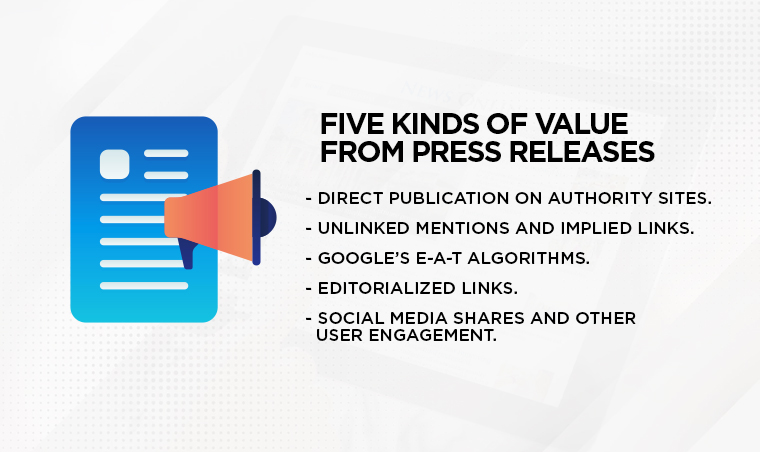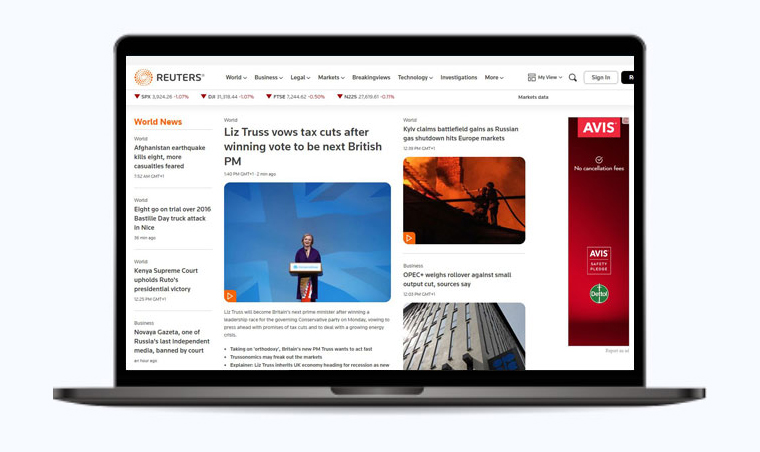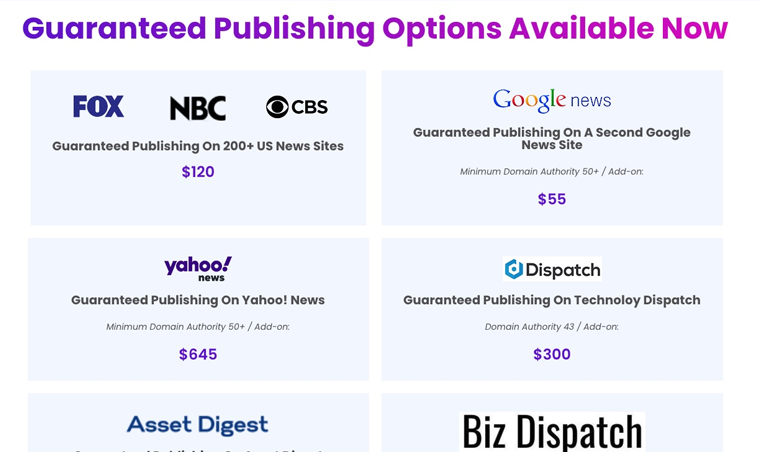
With press releases and SEO, there’s good news and bad news:
- The bad news is that press releases are generally considered ineffective as a direct SEO signal and sole link building strategy.
- The good news is you can still get quite a bit of SEO value from press releases if you use them properly.
That may sound unclear, which is part of why you may have read such mixed information about press releases and SEO.
So, let’s run down how press releases can work for you in terms of SEO and what you should (and shouldn’t) do to get the best returns.
Why Press Releases Can Struggle for SEO
The biggest challenge with using press releases for SEO purposes is that they’ve been heavily abused in the past, so some easy, low-hanging fruit strategies have been devalued.

What happened is this.
- Companies would produce press releases with whatever information they could think of to write about; usually something bland or generic like “Company X Releases New Blog Post,” and shotgun that press release to hundreds (or thousands) of websites. Many of those websites would ignore it, but some portion of them would publish the press release as-is. Usually, those were press release aggregators.
- The key was that the press release would have a link in it. Every website that published the press release as-is would then be linked to the company’s website, significantly boosting the backlinks and keywords they were targeting.
- Google, for obvious reasons, didn’t like this rapid and easy link-building strategy. It falls into the same primary category as user-generated links and, in some cases, even spam content. So, Google took action. They identified the worst offenders in terms of press release aggregators and devalued them (to the point that many of them no longer exist). They implemented penalties and devaluation for duplicate content.
- This strategy worked, but SEO pros found ways around it, so Google eventually had to improve its algorithm further to focus on this abuse. They did this back in 2013. However, Barry Schwartz mentioned at the end of this post that some third-party tests proved that press releases do in fact improve rankings. Press releases are still a viable marketing tactic, so what has changed?
What Google didn’t do was devalue press releases as a whole.
Press releases are still great for SEO when used the right way. It’s just that “send your press release to 10,000 sites in the hopes that 5% of them publish it and give you links” is not the right way, and spamming a press release is no longer effective. You need an effective press release plan.
So, how can you get good SEO value out of press releases? Read on to find out.
Five Kinds of Value from Press Releases
Press releases can bring you SEO value in five different ways. They’re all complimentary, and the process for gaining them is the same, which we’ll outline below. What are these five sources of SEO value?

1. Direct Publication on Authority Sites
Press releases being published as-is, with a link (even if the link is nofollowed) or no link, can still be beneficial if the publication is on an authority site. Every industry and niche has authority sites, whether major sites like Forbes or smaller, more focused sites. Google devalued many websites that did nothing but publish press releases, but many valuable sites publish press releases as one part of a much more robust blogging lineup.

When your press release is published on these sites, you gain SEO value through direct and indirect sources. These sources include the four other kinds of value below and things like associating your brand name and keywords with the authority site, reaching an audience (including content creators) with your press release, and more.
2. Unlinked Mentions and Implied Links
Unlinked mentions and implied links are both essentially the same thing. There’s an example of up just above. We mentioned Forbes, but we didn’t link to them. Google can see that we mentioned them and understand that the mention can be referential and important.
Of course, Google doesn’t treat unlinked mentions the same as a link.
There’s no direct passing of link juice or other SEO metrics. However, unlinked mentions are helpful for users, who may seek out that site or simply recognize it when they come across it later. That makes those users more engaged, less likely to bounce, more likely to think of that site when the topic comes up, and so on.
These secondary user behavior metrics are tracked by the site and by Google and can be beneficial for SEO, ad quality score, and other more functional or direct metrics.
When you send out your press release, and people either publish it directly or write about you without linking, it still builds a whole constellation of secondary benefits for you.
3. Google’s E-A-T Algorithms
E-A-T is part of Google’s algorithm and helps them judge the value of a site based on a variety of trust signals and related metrics. E-A-T stands for Expertise, Authoritativeness, and Trustworthiness, and it applies to your site as a whole and the authors writing content for your site if they’re named.

E-A-T grows in a variety of ways, including both on-site and off-site signals. Press releases help you build off-site signals through implied links/brand mentions, links and mentions on authority sites, and a variety of user behaviors that can be tracked and attributed to some level of trust in your brand or your author.
You can read a deeper analysis of E-A-T, how it works, and how to maximize it here.
4. Editorialized Links
Another benefit of press releases is their value, not from being published but from providing information to journalists.
An essential part of writing press releases is providing enough information to a journalist or reporter that they can cover you without needing to do a ton of groundwork to decide whether or not your news is worth their time.

Your press release isn’t necessarily designed to be published as-is or read by the public; instead, it’s designed to attract the interest and attention of industry bloggers and reporters.
These content creators may be cautious of copied content and don’t want to publish a press release as-is because other sites may also have published it, which looks risky.
Instead, they want to take your press release as a starting point and do their own reporting to create unique coverage of the topic with their own spin and perspective.
In the content they create, they’ll likely still link to you because the content is about you and that link helps their readers. It might be a nofollowed link, but even so, that link can be helpful. Moreover, since it’s not sponsored content and not duplicated content, the link is more likely to be followed and pass link juice directly. This instance is the most direct and valuable benefit to SEO from press releases, though it’s a bit more challenging to get now than it has been in the past.
5. Social Media Shares and Other User Engagement
Press releases can also be shared on social media, linked to other blogs, and generally shared around the web. There are a lot of secondary user behaviors that may not benefit your SEO directly.

Still, it either benefits other things that help SEO or gives you more information in your analytics that you can use to optimize your marketing campaigns in different ways.
How to Use Press Releases for SEO Effectively
Using press releases for SEO is not only possible, but it’s also an effective and highly-recommended strategy. It’s just a little more complicated than it used to be and requires serious effort into the content itself. So, here’s an outline of a strategy you can use to build SEO benefits using press releases.
1. Write a Great Press Release
The first thing you need to do is write an excellent press release. The biggest hurdle to overcome when using press releases for marketing is that thousands of firms are out there every day creating the spammiest, lowest-quality press releases you’ve ever seen and sending them out to every media venue they can think of.

As such, reporters, journalists, bloggers, and content creators are generally inundated with garbage, so you must stand out, value the journalist’s time, and get to the point.
Keep it short, keep it newsworthy, don’t spam it full of keywords and links, and so on. If you’re not confident in writing a great press release, you can always have us do it for you, too. If not, here are some tips you can follow to get most of the way there.
- Make sure your topic is newsworthy in the first place.
- Get right to the point; value the time of the people you’re sending your release to.
- Don’t include a ton of links, and especially don’t include transactional or advertorial links.
- Use keywords where appropriate, but don’t over-optimize or include too many keywords.
- Make your headline as appealing as possible. We have a whole guide on this.
- Keep it short and valuable.
Writing a great press release is a skill it can take time to develop, which is why we offer press release writing services in addition to promotion. When you want news coverage, you don’t have time to learn a whole new skill to do it right.
2. Be Picky With Who You Send Your Press Release To
You should send press releases to a relatively small list of websites, journalists, bloggers, and content creators. The broader your list, the more it looks like spam, and the less likely most people will pick it up and publish it or write about it.
Focus on sites that cover news in your industry and niche. Focus on big-name news outlets, bloggers who may genuinely be interested in what you have to say, and content creators who have covered your brand favorably in the past. You can also send your press release as a tip to more prominent news and media agencies. Still, targeting specific journalists or editors is often better than general tip lines.

You can do this by developing and curating a list of the websites and media outlets you might want to target, tracking who you send it to and when, and what response (if any) you get. Or, you can use a reputable press release distribution service with industry-specific services. We get our client’s press releases on sites like Reuters, Market Watch, ABC, Forbes, and the New York Times, every day of the week.
While you’re at it, you can also consider local and offline media as avenues for press release distribution. Offline media won’t impact your SEO directly but can encourage online media coverage.
Local media is always effective for small businesses that can capitalize on it.
3. Avoid Sending Your Press Release to Junk Aggregators
One of the most significant risks to press release marketing these days is the low-quality press release aggregators. Hundreds of sites will happily accept your money in exchange for publishing your press release on their site (with thousands of daily visitors!) and even syndicate it across a network of unspecified blogs.

If you’re okay with a copy of your press release on a blog on the tenth page of Google, go for it, but it’s not generally going to benefit you. Most of the time, the visitors to these sites aren’t interested in reading press releases; they’re other business owners looking to promote them. The blogs they syndicate to are never any good, either.
4. Engage Your Visitors When They Arrive
Finally, when your press release brings people to your blog or site, generally looking for more information, make sure to engage them. You know why they’re here – you wrote a press release about it – so give them what they want.

You’ve come to the right place if you need professional-level press release writing, marketing, and distribution services. We’re experts in press releases and know how to avoid all the pitfalls that can get a site slapped by Google. Properly used press releases can be an excellent tool in your marketing arsenal, and we can help you use that tool. Drop us a line to learn more!
